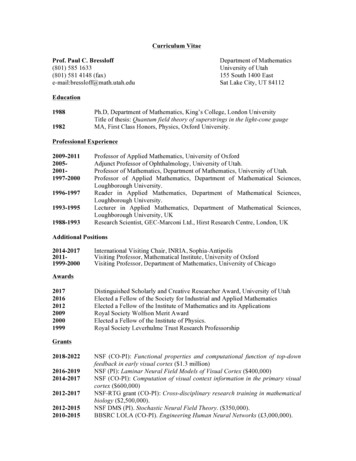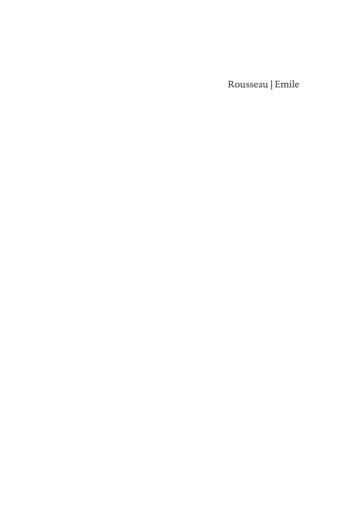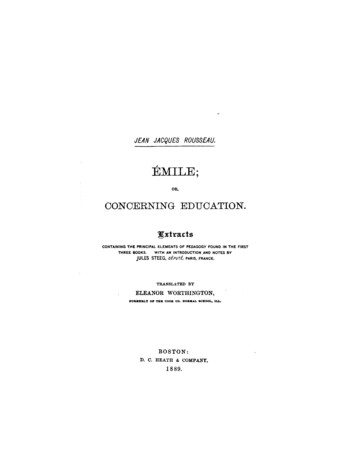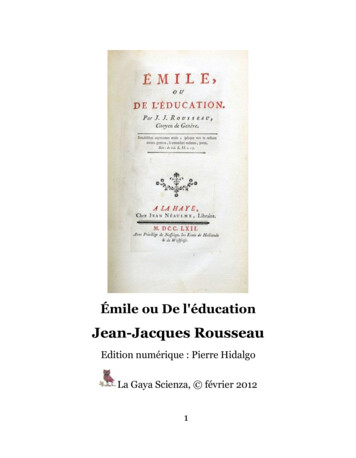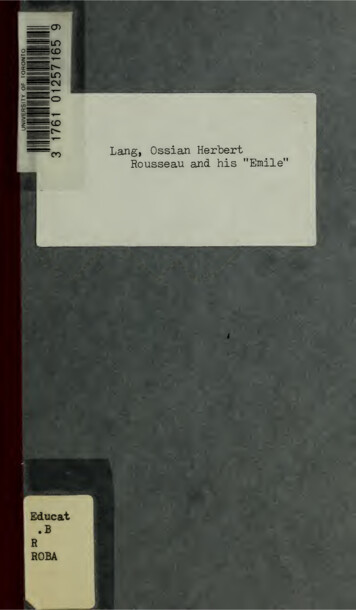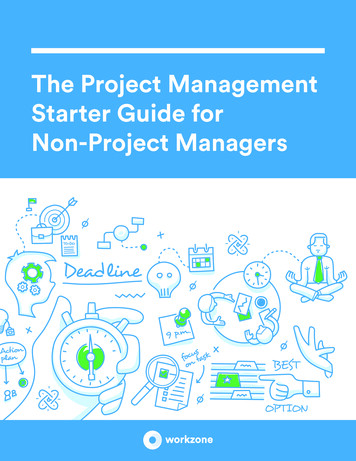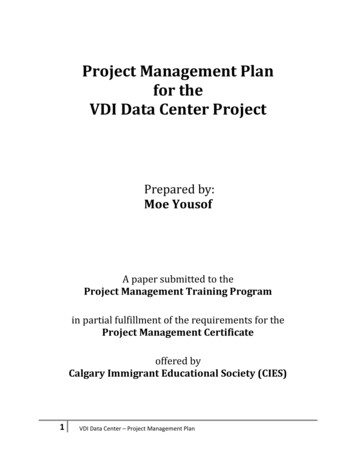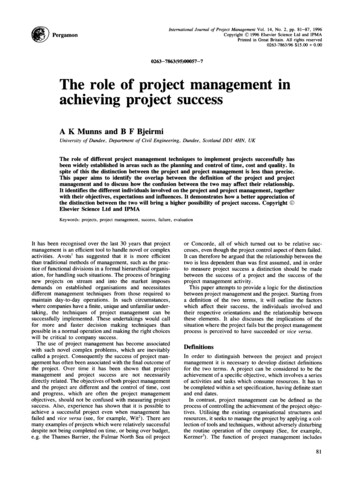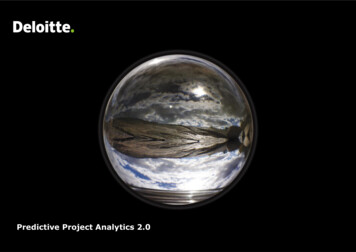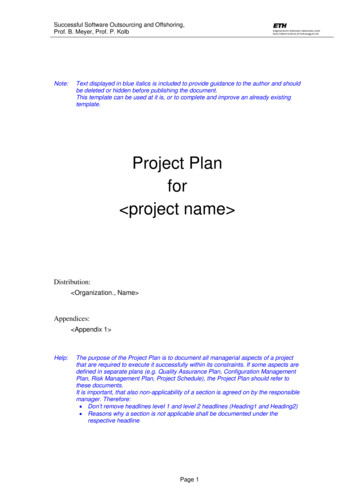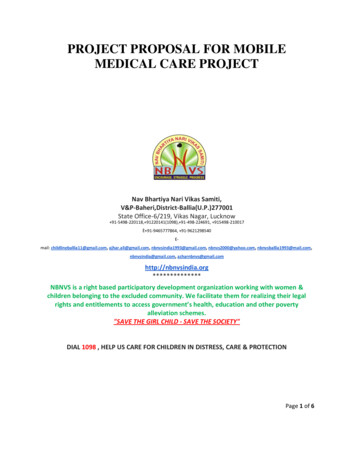![Emile [Book 1] - SOPHIA PROJECT](/img/6/rousseau-emile1.jpg)
Transcription
Emile [Book 1]Jean Jacques RousseauIntroductionWhat does Rousseau believe tobe the cause of the corruption ofhuman beings? What does hethink can be done to stem the tideof this corruption?God makes all things good; man meddles with them andthey become evil. He forced one soil to yield the productsof another, one tree to bear another’s fruit. He confuses andconfounds time, place and natural conditions. He mutilateshis dog, his horse, and his slave. He destroys and defaces althings; he loves all that is deformed and monstrous; he willhave nothing as nature made it, not even man himself, whomust learn his paces like a saddle-horse, and be shaped to hismaster’s taste like the trees in his garden.Yet things would be worse without this education andmankind cannot be made by halves. Under existing conditionsa man left to himself from birth would be more of a monsterthan the rest. Prejudice, authority, necessity, example, allthe social conditions into which we are plunged, would stiflenature in him and put nothing in her place. She would be likea sapling chance sown in the midst of the highway, bent hitherand thither and soon crushed by the passers-by.Tender, anxious mother, I appeal to you. You can removethis young tree from the highway and shield it from the crushingforce of social conventions. Tend and water it ere it dies. Oneday its fruit will reward your care. From the outset raise a wallround your child’s soul; another may sketch the plan, you aloneshould carry it into execution.Plants are fashioned by cultivation, man by education. Ifa man were born tall and strong, his size and strength wouldbe of no good to him till he had learnt to use them; they wouldeven harm him by preventing others from coming to his aid;left to himself he would die of want before he knew his needs.We lament the helplessness of infancy; we fail to perceive thatthe race would have perished had not man begun by being achild.We are born weak, we need strength; helpless, we need aid;foolish, we need reason. All that we lack at birth, all that weneed when we come to man’s estate, is the gift of education.This education comes to us from nature, from men, or fromthings. The inner growth of our organs and faculties is theeducation of nature, the use we learn to make of this growth isthe education of men, what we gain by our experience of ourSophiaOmniwww.sophiaomni.org1
Note:three masters: nature,things and education (men). Sincenature is more or less out of ourcontrol, Rousseau believes thatthe education of a child must bedone in conformity with nature.surroundings is the education of things.Thus we are each taught by three masters. If their teachingconflicts, the scholar is ill-educated and will never be at peacewith himself; if their teaching agrees, he goes straight to hisgoal, he lives at peace with himself, he is well-educated.Now of these three factors in education, nature is whollybeyond our control, things are only partly in our power; theeducation of men is the only one controlled by us; and evenhere our power is largely illusory, for who can hope to directevery word and deed of all with whom the child has to do.Viewed as an art, the success of education is almostimpossible, since the essential conditions of success are beyondour control. Our efforts may bring us within sight of the goal,but fortune must favor us if we are to reach it.What is this goal? As we have just shown, it is the goal ofnature. Since all three modes of education must work together,the two that we can control must follow the lead of that whichis beyond our control. Perhaps this word Nature has too vaguea meaning. Let us try to define it.Nature, we are told, is merely habit. What does that mean?Are there not habits formed under compulsion, habits whichnever stifle nature? Such, for example, are the habits of plantstrained horizontally. The plant keeps its artificial shape, butthe sap has not changed its course, and any new growth theplant may make will be vertical. It is the same with a man’sdisposition; while the conditions remain the same, habits, eventhe least natural of them, hold good; but change the conditions,habits vanish, nature reasserts herself. Education itself is buthabit, for are there not people who forget or lose their educationand others who keep it? Whence comes this difference? If theterm nature is to be restricted to habits conformable to naturewe need say no more.Everything should therefore be brought into harmony withthese natural tendencies, and that might well be if our threemodes of education merely differed from one another; butwhat can be done when they conflict, when instead of trainingman for himself you try to train him for others? Harmonybecomes impossible. Forced to combat either nature or society,you must make your choice between the man and the citizen,you cannot train both.The Infant (Birth-Age 5)People think only of preserving their child’s life; this is notenough, he must be taught to preserve his own life when he is aman, to bear the buffets of fortune, to brave wealth and poverty,to live at need among the snows of Iceland or on the scorchingrocks of Malta. In vain you guard against death; he must needsdie; and even if you do not kill him with your precautions, theyare mistaken. Teach him to live rather than to avoid death: lifeis not breath, but action, the use of our senses, our mind, ourfaculties, every part of ourselves which makes us conscious ofour being. Life consists less in length of days than in the keenSophiaOmniwww.sophiaomni.org2
Note: Swaddling clothes: It wasa custom in Rousseau’s day towrap the infant tightly to preventhim from harming himself - apractice that Rousseau stronglydiscouragessense of living. A man may be buried at a hundred and maynever have lived at all. He would have fared better had he diedyoung.Our wisdom is slavish prejudice, our customs consist incontrol, constraint, compulsion. Civilized man is born anddies a slave. The infant is bound up in swaddling clothes, thecorpse is nailed down in his coffin. All his life long man isimprisoned by our institutions.The new-born child requires to stir and stretch his limbs tofree them from the stiffness resulting from being curled up solong. His limbs are stretched indeed, but he is not allowed tomove them. Even the head is confined by a cap. One wouldthink they were afraid the child should look as if it werealive.The Child’s MotherWhy is Rousseau so critical of thepractice many mothers had in hisown age of leaving children to beraised by nurses? Do you thinkthat it is fair to make an analogybetween this practice and the extensive use of day care in our owntimes?What is the origin of this senseless and unnatural custom?Since mothers have despised their first duty and refused tonurse their own children, they have had to be entrusted tohired nurses. Finding themselves the mothers of a stranger’schildren, without the ties of nature, they have merely triedto save themselves trouble. A child unswaddled would needconstant watching; well swaddled it is cast into a corner and itscries are unheeded. So long as the nurse’s negligence escapesnotice, so long as the nursling does not break its arms or legs,what matter if it dies or becomes a weakling for life. Its limbsare kept safe at the expense of its body, and if anything goeswrong it is not the nurse’s fault.These gentle mothers, having got rid of their babies, devotethemselves gaily to the pleasures of the town. Do they knowhow their children are being treated in the villages? If thenurse is at all busy, the child is hung up on a nail like a bundleof clothes and is left crucified while the nurse goes leisurelyabout her business. Children have been found in this positionpurple in the face, their tightly bandaged chest forbade thecirculation of the blood, and it went to the head; so the suffererwas considered very quiet because he had not strength to cry.How long a child might survive under such conditions I do notknow, but it could not be long. That I fancy, is one of the chiefadvantages of swaddling clothes.Not content with having ceased to suckle their children,women no longer wish to do it; with the natural resultmotherhood becomes a burden; means are found to avoidit. They will destroy their work to begin it over again, andthey thus turn to the injury of the race the charm which wasgiven them for its increase. This practice, with other causes ofdepopulation, forebodes the coming fate of Europe. Her artsand sciences, her philosophy and morals, will shortly reduceher to a desert. She will be the home of wild beasts, and herinhabitants will hardly have changed for the worse.Ought the question, however, to be considered only fromthe physiological point of view? Does not the child need aSophiaOmniwww.sophiaomni.org3
mother’s care as much as her milk? Other women, or evenother animals, may give him the milk she denies him, but thereis no substitute for a mother’s love.The woman who nurses another’s child in place of herown is a bad mother; how can she be a good nurse? She maybecome one in time, use will overcome nature, but the childmay perish a hundred times before his nurse has developed amother’s affection for him.And this affection when developed has its drawbacks, whichshould make every sensible woman afraid to put her child outto nurse. Is she prepared to divide her mother’s rights, or ratherto abdicate them in favor of a stranger; to see her child lovinganother more than herself; to feel that the affection he retainsfor his own mother is a favor, while his love for his fostermother is a duty; for is not some affection due where there hasbeen a mother’s care?To remove this difficulty, children are taught to look downon their nurses, to treat them as mere servants. When their taskis completed the child is withdrawn or the nurse is dismissed.Her visits to her foster-child are discouraged by a coldreception. After a few years the child never see her again. Themother expects to take her place, and to repair by her crueltythe results of her own neglect. But she is greatly mistaken;she is making an ungrateful foster-child, not an affectionateson; she is teaching him ingratitude, and she is preparing himto despise at a later day the mother who bore him, as he nowdespises his nurse.How emphatically would I speak if it were not so hopelessto keep struggling in vain on behalf of a real reform. Moredepends on this than you realize. Would you restore all mento their primal duties, begin with the mothers; the results willsurprise you. Every evil follows in the train of this first sin;the whole moral order is disturbed, nature is quenched in everybreast, the home becomes gloomy, the spectacle of a youngfamily no longer stirs the husband’s love and the stranger’sreverence. The mother whose children are out of sight winsscanty esteem; there is no home life, the ties of nature arenot strengthened by those of habit; fathers, mothers, children,brothers, and sisters cease to exist. They are almost strangers;how should they love one another? Each thinks of himself first.When the home is gloomy solitude pleasure will be soughtelsewhere.But when mothers deign to nurse their own children, thenwill be a reform in morals; natural feeling will revive in everyheart; there will be no lack of citizens for the state; this firststep by itself will restore mutual affection. The charms ofhome are the best antidote to vice. The noisy play of children,which we thought so trying, becomes a delight; mother andfather rely more on each other and grow dearer to one another;the marriage tie is strengthened. In the cheerful home life themother finds her sweetest duties and the father his pleasantestrecreation. Thus the cure of this one evil would work a widespread reformation; nature would regain her rights. WhenSophiaOmniwww.sophiaomni.org4
women become good mothers, men will be god husbands andfathers.Disciplining the ChildWhy does Rousseau believe thatpampering a young child will ultimately prove harmful to that child?Do you agree with his views onthis subject?What are Rousseau’s views onthe disciplining of young children.Do these views strike you as beingunduly harsh or simply realistic?There is another by-way which may tempt our feet from thepath of nature. The mother may lavish excessive care onher child instead of neglecting him; she may make an idol ofhim; she may develop and increase his weakness to preventhim feeling it; she wards off every painful experience in thehope of withdrawing him from the power of nature, and fails torealize that for every trifling ill from which she preserves himthe future holds in store many accidents and dangers, and thatit is a cruel kindness to prolong the child’s weakness when thegrown man must bear fatigue.Thetis, so the story goes, plunged her son in the waters ofStyx to make him invulnerable. The truth of this allegory isapparent. The cruel mothers I speak of do otherwise; theyplunge their children into softness, and they are preparingsuffering for them, they open the way to every kind of ill, whichtheir children will not fail to experience after they grow up.Fix your eyes on nature, follow the path traced by her.She keeps children at work, she hardens them by all kinds ofdifficulties, she soon teaches them the meaning of pain andgrief. They cut their teeth and are feverish, sharp colics bring onconvulsions, they are choked by fits of coughing and tormentedby worms, evil humors corrupt the blood, germs of variouskinds ferment in it, causing dangerous eruptions. Sickness anddanger play the chief part in infancy. One half of the childrenwho are born die before their eighth year. The child who hasovercome hardships has gained strength, and as soon as he canuse his life he holds it more securely.This is nature’s law; why contradict it? Do you not see that inyour efforts to improve upon her handiwork you are destroyingit; here cares are wasted? To do from without what she doeswithin is acco
Emile [Book 1] Jean Jacques Rousseau Introduction God makes all things good; man meddles with them and they become evil. He forced one soil to yield the products of another, one tree to bear another’s fruit. He confuses and confounds time, place and natural conditions. He mutilates his dog, his horse, and his slave. He destroys and defaces al things; he loves all that is deformed and .
